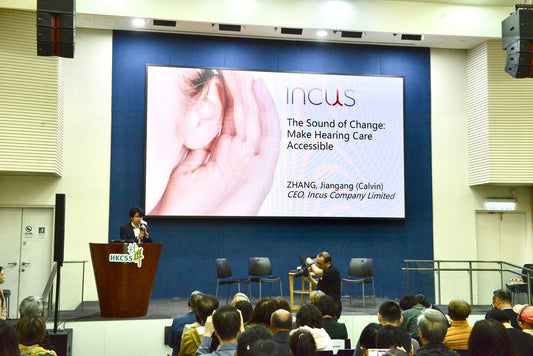We have all experienced how social isolation feels like during the COVID-19 lockdowns. It is more difficult to stay in touch with relatives, especially elderly who are not familiar with technology or those who have an untreated hearing loss, as they can’t participate in phone calls. Masks and social distancing have seemingly become the bane of socializing since people are aware of the situation. In this article, we we will explain the importance of social skills and how socialisation affects our health.
The Relationships Between Socialization and Health
It has been proven that socialization is associated with health. US scientists have found that individuals who establish good interpersonal relationships are 50% less likely to die prematurely compared to those with poor interpersonal relationships.
But how exactly does socializing improve our health?
In short, there are three mechanisms through which socialization can affect health.
1. Behaviour
A wide range of individual behaviours can affect health, morbidity and mortality. Social connections instill care which can protect our health and the others. For instance, spouses can contribute to their partner's health through monitoring, suppressing, regulating, or performing healthy behaviours.
2. Psychology
Refers to psychosocial concerns and sociology. In this respect, people who are socially active may have clearer purposes or goals in life than those who are inactive, leading to improved physical and mental health.
3. Physiology
Being involved in social activities has deep effects on the body and can affect how the body functions. Supportive interactions with others improve immune, endocrine, and cardiovascular functions. A supportive social environment can reduce the severity of stress, which has adverse effects on coronary arteries, insulin levels, and the immune system.
These mechanisms demonstrate the association between socialization and health, in a way that socailizing is healthy for us, but how exactly does it benefit us?
Six Benefits of Being Social
It goes without saying that improving your social skills is important. Being social can benefit you in several ways:
- Expand your network. In social life, as long as you communicate with people wholeheartedly, you are able to form an invisible "relationship network”. The network can benefit you on strengthening business connections, getting fresh ideas and building up your confidence.
- Receiving Information. You can obtain the latest and valuable information or knowledge in a short and fast way if you constantly communicate with people.
- Increased physical health. Seniors who engage in relationships tend to be more active, improving their physical health through their social activities.
- Boosted immune system. Studies show socially active seniors have increased immune systems, allowing them to fight off colds, flus and other ailments more easily.
- More positive outlook on life. Staying connected with others makes us feel more connected to the world and increases our sense of belonging.
- Improved mental sharpness. Keeping our brains active and engaged can sharpen our minds and reduce the risk of cognitive decline.
Of course, socializing is not a must. However, shying away from it could cause negative impacts to both your physical health and mental health.
What Happens If You Never Socialize with People
People who failed to establish interpersonal relationships well tend to have higher levels of cortisol, also known as the stress hormone, which can be detrimental to health. The possibility of dementia and depression would also increase as you get older.
Dementia is one of the brain diseases which causes long-term and gradual deterioration of thinking ability and memory and affects basic function. Common symptoms include emotional problems, language problems, and reduced mobility.
While depression refers to a mood disorder. It may be described as feelings of sadness, loss, or anger that interfere with a person’s everyday activities. People experience depression in different ways. It may interfere with your daily work, resulting in lost time and lower productivity. It can also influence relationships and some chronic health conditions.
A good interpersonal relationship can make people feel happy and increase white blood cells that can improve immunity. People who never participated in social activity tend to imagine how people will interact with them and how they can respond constantly, resulting in anxiety and pressure. It can be overcome by attending small gatherings.
Though, socializing is not an easy task. Besides needing the confidence to talk, it requires the ability to listen, and to interpret what the speaker is presenting so that you can give a response.
Then the question becomes: how does one socialize or communicate when they can’t hear well?
Importance of Hearing During Conversation
The ability to hear enables us to connect to the world. Most importantly, hearing connects us to people to communicate in a way that none of our other senses can achieve.
Forming strong interpersonal relationships requires us to be able to comprehend speech.
Consider the feeling of an in-person interaction compared to that of a conversation through texting or email.
An in-person interaction is more engaging and allows us to more efficiently form social bonds.
For someone with an untreated hearing loss, it is harder to get the same benefits from an oral conversation. Without good hearing in both ears, understanding what a person is saying requires more concentration and could be exhausting, especially if several people are talking or there's background noise.
Untreated hearing loss often causes friction in conversation. This friction is for example when someone is asked to repeat themselves or “drops out” of the conversation.
It can also come in the form of the person with hearing loss talking too soft or too loud: Since they can’t hear themselves, they do not know whether the volume they are speaking at is appropriate.
Misunderstandings are common. The inability to hear certain words or sounds correctly easily results in wrong interpretation.
In fact, hearing loss not only affects one’s ability to understand others, but also one’s own speech.
The reason is that if we cannot hear our own voice well, we won’t be able to self-adjust when we have slurred speech or speak too loudly.
If you find that the people who are communicating with you have difficulty listening to speech while they are not using any hearing device, you could encourage them to have an evaluation of their hearing ability and consider whether the use hearing aids or amplifiers could help.
Some high-tech hearing amplifiers include technologies such as speech separation, intelligent noise reduction, customised sound and bluetooth streaming etc. Incus is one of the companies to provide a smart personal sound amplifier which empowers people to stay connected through conversations.
Conclusion
Interpersonal relationships will become our valuable assets through our growth and continuous learning rather than a burden. Communication is an important skill in socialisation. People with hearing impaired could lose communication skills which affects their social health. Learn more by reading how to protect your hearing health.



